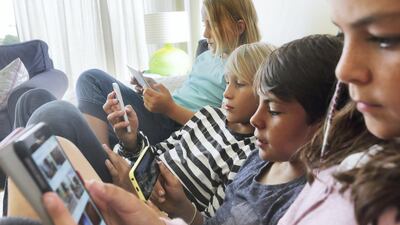From the age of eight I would read a few pages of a book before dozing off every night. This gave me a passion for words, and I certainly owe these books a great deal. In fact, it is reading that saved my writing.
I was taking intensive writing classes for years before the idea of penning a story clicked with me, but I also learnt by reading Jacqueline Wilson, Roald Dahl and Francesca Simon. When returning one book to the library, I would immediately check out another. This ongoing cycle of reading helped me gain insight into the world of writing and literature.
Reading exposed me to perspectives and experiences unlike my own. Furthermore, imagination is exercised when you read; it's up to you how to picture the scene, characters, sounds and colours, while the author merely steers you. The more I read, the more inspiration I had to write. Books steered my creativity – the words motivated me to write poetry of my own.
But then everything changed overnight, when I got a phone. Unlike eight-year-old me, I found my teenage self having to choose between my newly bought iPhone 5 and that week's read. Through reading thousands of pages, my abilities as a thinker and as a creative blossomed. I picked up my phone and began the never-ending scroll, and it feels like I've been scrolling ever since, passively taking in the images, videos and short bits of text typical of most content on social media. I now feel like over the years I have wasted hours distracted, disengaged and hypnotised by technology.
It takes a lot of time and effort to maintain an account on social media. According to a 2018 study by the UK's broadcasting and telecoms regulator Ofcom, one fifth of 16 to 24-year-olds spend seven hours a day online, creating a "digital dependency". It has also been proven that receiving notifications can significantly disrupt performance on a task, and that perhaps even the mere presence of your phone has this effect.
As a fresh graduate, I look back at the hours spent buried in my phone with slight horror and much regret. Reading books is what made me want to be a writer, but when was the last time I read a book for my own purpose, enjoyment or fulfilment (aka, for non-academic reasons)?
When I ask my friends when they last read a book, they sheepishly laugh. Our polished and well-populated Instagram and Facebook profiles and long browsing histories answer the question on our behalf.
There is a difference between passive and active consumption: anyone can feel the disparity in the effort it takes to read a book compared to watching a TV show or tapping through Insta stories. I always feel brain-dead and drained after an hour on my phone, whereas 60 minutes spent reading a book leaves me feeling enlightened, happily tired and relaxed. It's been reported that the average human attention span has dropped from 12 seconds in 2000 to eight seconds in 2013. There has also been an increase in incidences of attention deficit disorders. It is alarming to think how much technology has cognitively changed us, and potentially even weakened us.
In terms of the benefits of reading, the stats are there. Many studies have shown that reading is vital to a child’s cognitive development; and is a more important factor than the educational level of parents. Reading for pleasure is more indicative of a child’s achievement in life than their socio-economic background.
To read is to be secluded; it is spending time with yourself. Unlike social media, it’s an act of introspection, and not about the external or superficial. It doesn’t leave you with more noise in your head than you can handle.
I’m not trying to claim that social media is entirely negative, but its contents do not nourish my mind or soul in the way that delving into the depths of a book can. The medium of a book can offer more than most online platforms, if you concentrate long enough to explore it.
If my time is precious, which I believe it is, then I ought to be more mindful of how I spend it. Technology is harder to avoid than ever, but books have been integral to so many facets of my development, and served me in ways my phone never did.
The years of neglecting a regular routine of reading has hindered my ability to focus, engage and explore – I’m worried I’ll never get that back.
I know I need to return to reading, but the amount of unread books sitting in my bedroom almost intimidates me. Do I need to pick those up first, or do I go out and find what interests me right now?
Either way, I ought to embrace airplane mode and just pick something up. Because, if I managed to read a few pages a night when I was eight, surely my 22-year-old brain can do so, too.

